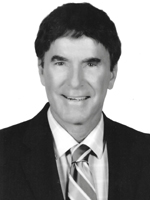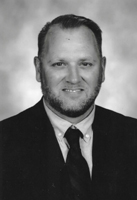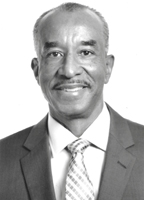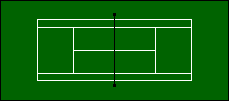 |
|||
 |
 |
 |
|
Roger Cornelius Gull Lake |
James Slaughter U of D Jesuit |
Clarence Wynn Cass Tech |
|
(click on Inductee's name to read 'description')
 |
|||
 |
 |
 |
|
Roger Cornelius Gull Lake |
James Slaughter U of D Jesuit |
Clarence Wynn Cass Tech |
|
(click on Inductee's name to read 'description')

 Roger Cornelius, Gull Lake High School
Roger Cornelius, Gull Lake High SchoolWhen Roger Cornelius was hired as the new French teacher at Gull Lake High School, he was also asked to help coach football. After all, he had played the sport at Wheaton College. “I wasn’t interested in coaching it,” he says. “By then, I was playing a lot of competitive tennis. But I made it through the fall season. The boys varsity tennis coach asked me to be his JV coach in the spring, the beginning of my 41 years of continuous tennis coaching at Gull Lake. It was never a plan, but that’s how it worked out.”
Indeed, it worked out well, even at the beginning. In 1976, Roger fielded such a strong girls team that they won the conference and regional titles, and then advanced to the state tournament which was played at Stowe Stadium. Although it was cold – with some snow on the courts – his kids played well enough to finish fourth. “For such a young naïve coach, it was huge,” he says.
In the ‘80s, Roger had the good fortune to coach strong boys teams that included Hall of Famer Jim Cummins’ two sons. One of these teams finished third in the state one year and a 4S player won the state championship.
“Roger is a solid coach and well-liked by parents and fellow coaches,” says Jim, who coached at nearby Battle Creek Springfield. “My sons played for him and I have played tennis with and against him. Our teams used to compete against each other in a dual match and in two different tournaments each year. He is a good, friendly guy to be around and you know he is going to play by the rules.” Indeed, Jim’s son Scott was such a strong Gull Lake player that he reached the semifinals of the state tournament before losing to the eventual state champion.
In both seasons, his teams were always in the top 4 of the conference,” says Allegan’s Gary Ellis. “He also had some top ten finishes in the state in both boys and girls. In the 2000 boys season his team broke Allegan's 13 consecutive years winning the conference.”
But more to the point, Roger was and is good for kids and good for tennis. “He was very positive with players on both teams,” says Gary. “He offered sincere congratulations when your team or players beat his and was gracious when he beat you and offered kind words to his vanquished opponents. My girls actually invited him to our end of season awards banquet two or three times. He didn't make it but sent nice notes of congratulations to them.”
This past fall, he received the Wolverine Conference Distinguished Service Award, the highest award given by the league, even though Gull Lake has not been in the league since 2011-12. “He did so much for league tennis that he was still recognized for that,” says Gary.
In Roger, Gull Lake has enjoyed the services of a tennis coach who has been a teaching pro for three decades through the Professional Tennis Registry. He went to Dennis VanderMeer’s Tennis University where he received training and credentials. He has directed a summer program for over 40 years for the Greater Richland Area. Of course, it doesn’t hurt him or his kids to be close to Kalamazoo and Stowe Stadium.
And he loves to play. Roger participated in travel tennis at Wheaton and then continued when he moved to the Battle Creek area. His partners and opponents include Hall of Famer Cummins, current Secretary-Treasurer Gary of Allegan (with whom he once won a medal at the Irish Open at West Hills in Kalamazoo), former MHSTeCA President Mike McGinnis of Battle Creek Lakeview, and former President Peter Militzer of Portage Central. “We were doubles partners for several years and I really enjoyed playing with him,” says Gary. “I loved having him at the net - he's very active and effective there. I usually held my serve, in part because he kept the receiver off guard with his poaching prowess.”
“When your team plays Gull Lake, it’s like meeting up with a dear friend,” says Portage Central’s Peter Militzer. “Roger is sincerely an exceptionally nice person. His teams always are well-coached and compete well. It’s a rare day when one team or the other has an easy win, yet things never get tense.”
“When Roger greets our team it’s always the same, ‘Where is Mustang Sally’?” (Mustang being the nickname of the school) continues Peter. “Then he will explain the song Mustang Sally to our girls, who usually aren’t familiar with that 1966 tune. Roger generally greets me speaking French, as he is fluent. Often during matches you can hear him speaking French to himself, players, spectators, me, etc.
Indeed, for Roger it is as much about relationships as about winning contests. 2006 Assistant Coach of the Year Chuck Parker (then an assistant at Portage Central and recently retired varsity coach at Otsego) is deemed a close friend. So is Gull Lake’s 2014 Assistant Coach of the Year Hap Haasch with whom Roger credits much of his success – “He was and is a godsend.” What about the former player who took out his gall bladder a few years ago? Yes, he’s a doctor. The 4S player who won a state championship? He’s a neighbor.
This is a man who is (1) a very good tennis player, one that doubles partners and opponents love to play with and against, (2) a very good coach who has affected so many lives, (3) a very good friend to both colleagues and kids, and (4) someone who cherishes the game. His writing is sprinkled with phrases such as “this marvelous sport” or “this wonderful sport.” Inclusion into the Hall of Fame puts him in the company of close friends. Right where he belongs.
| Back to Top |
 James Slaughter, U of D Jesuit High School
James Slaughter, U of D Jesuit High SchoolThere are three things that are impressive about Jim Slaughter: (1) Wherever he has gone, his teams have done very well; (2) He has been recruited to coach at very high-pressure, perennially powerful programs that demand excellence; and (3) He has achieved considerable success while insisting on and enforcing high standards of character. Indeed, what got the attention of the board of directors in Oct. 2013 when he was voted boys coach of the year was the story upon story that went around the room regarding how Jim would bench a player for poor conduct. This doesn’t happen often enough these days, one coach noted at the time.
(1) “Done very well” is an understatement. Even when Jim coached teams which had been strong since the good old days, they showed improvement. “Our team (U of D) evolved quickly from a decent middle of the pack team into a serious contender for the state title,” says former player Marty Nagle. “We competed against and knocked off teams that years ago would overlook a match against us. He led our team to our best season in school history, finishing second overall in the state and officially securing our status as a regular top spot in the state tournament.”
Actually, Jim’s first stint at U of D – one that lasted eight years – wasn’t so great. But the team qualified for the state tournament in 1999 and gained momentum. But then Jim left U of D to become principal of St. Mary Magdalen Catholic grade school. “After two years as principal, I missed teaching and coaching,” he says. His connection to the president of Brother Rice got him a teaching job in theology and an assistant tennis position under Grant Asher. When Grant left for University of Detroit Mercy, Jim took over and in his second year, led a team that won the school’s eighth state championship.
(2) When a job opened up at U of D Jesuit, Jim took it with no intent on coaching, but with the untimely death off Keith Bernacki (Hall of Fame Class of 2012), the folks at Birmingham Seaholm asked Jim to become the interim coach. This is no small thing: Seaholm is and always has been a significant tennis power. Thus, Jim taught at U of D and coached at Seaholm for two years. Not surprisingly, they finished in the top ten.
But when the tennis job “back home” at U of D opened up, Jim took it. The result? At the end of his second season, his team finished at 8-1-1, won two tournaments, finished second in the conference to Detroit Catholic Central, and first in the regional. They went on to capture a runner-up trophy at the state tournament.
But that’s not all. “Judy Hehs asked me to join as Co-head Coach at Academy of Sacred Heart,” he says. “Since she was principal and is limited with time, she felt she needed not an assistant but a co-head coach. Coming off their first State Championship, they needed to refocus and plan a repeat.” And yes, with Jim’s help, the team went on to win it all again that next year.
(3) But perhaps what distinguishes Jim most from others is his self-identified position as “moral leader” of his teams. Multiple stories are told with regard to his ability to take a player with temper management problems and get him to refocus in the midst of a match. Or if necessary, bench him. This is not so easy in that there are egos involved, especially when a team member who played 2D last year has to accept the position of 4D his senior year because of an influx of talent. Jim describes this part of the job as difficult, a challenge he continually strives to master but it makes sense that he is so committed. After all, he teaches Christian Morality, first at U of D, then at Brother Rice, and then back at U of D. He does this in an environment given to high expectations from some parents who consider themselves entitled and who may have a different sense of morality.
Perhaps even more impressive is how Jim managed himself while coaching not just boys but girls. Coaches throughout the state will testify that the situations are very different. “Between the two girls and our son, currently playing for Coach Slaughter, I have put in numerous hours courtside and have observed many coaches in action,” says parent Colleen Nagle. “I was impressed with Jim’s coaching technique and positive presence on the courts. The U of D boys went on to achieve a team best at the state finals last year. The following spring (2013) at the Academy of the Sacred Heart -- then defending Division 4 state champions -- Jim helped guide the team to a second state championship in a row, a first in the school’s history.”
To date, Jim has helped lead the Sacred Heart Gazelles to three state titles. “I have known him from both sides of the net,” says Judy. “We met as competitiors when he coached at Livonia Ladywood many years ago. His proverbial feathers never get ruffled. He does not lose his cool. I don’t really know in which season Jim prefers to coach, but I do know that the young women whom he has coached have respected him for his comments during practice, his coaching during matches and his lessons on life.”
| Back to Top |
 Clarence Wynn, Cass Tech High School
Clarence Wynn, Cass Tech High SchoolA self-described “tennis convert,” Clarence Wynn didn’t begin high school tennis coaching until he gave up his position as varsity basketball coach. Growing up in a small town in Alabama, he played basketball and baseball in both high school and college. He went on to coach basketball at Cass Tech from 1985 to 1990. This is no small potatoes his teams achieved a 105-25 record over those years – gaining a berth in the state quarterfinals in 1988 before losing to eventual state champion Detroit Cooley. “Because of some health issues and a desire to coach a sport that’s a little less stressful, I resigned and began coaching tennis,” he says.
“Tennis was not a high level at Cass,” he continues, certainly an understatement. “I have never won a state championship, managed a regional, served on state committee, or been a board member.” Nevertheless, his boys have won 14 city league championships and his girls have captured 19, the past 18 being consecutive.
Why not more? The school cut tennis in 2013. As Clarence puts it, “I have continued to coach both teams as if I was getting paid (Read: unpaid volunteer for the past four years).
Certainly what Clarence has done over the years is monumental. Modestly, he states that his goal was simply to improve the program. “I feel that if the program was not improving, I was not doing a good job.”
He had a long way to go, bucking against considerable disadvantages. It was hard to get his kids to practices because – since there are no courts at Cass – they had to go 20 minutes to Belle Isle. Too often they had to find their own transportation. Furthermore, there wasn’t much of a budget for equipment. The team sometimes obtained practice balls from the SEMTA office.
Nevertheless, his program has been widely regarded as a class act. The Player Information Sheets are properly filled out. The kids are well-behaved. Their coach is present at regional seeding meetings regardless of whether or not his kids have a chance at getting a seed. Their coach either runs or helps out at all of the Detroit Public School Division 1 City Championships. And he attends almost every MHSTeCA workshop in Troy.
For so many years, Clarence did this without the aid of an assistant, that is until Hall of Famer Fuzz Corey volunteered. “I’d known Coach Wynn for several years since Troy -- where Fuzz had previously coached -- had been going to Grosse Pointe for our regional,” he says. “I always wanted to help out a Detroit team at some point and knew him to be a good guy so I asked if I could join him.”
Fuzz quickly learned first hand that Clarence is more than just a good guy. Because Cass doesn’t play in the best league, he went out of his way to compete in Saturday tournaments out of the city and to schedule scrimmages in nearby Southfield. Often enough, they finished fourth in their regional behind such powerhouses as Grosse Pte. South, Troy, and Troy Athens.
More to the point, he looks after his kids. “What he does is really care about the welfare of the players, not just driving them to the site, but caring about their academic studies and their home life,” says Fuzz. “He stresses the tradition of Cass and its continued winning record in the Detroit city league.”
Back in 1997, Clarence underwent successful open heart surgery. At the time, he jokingly called it his mid-life tune-up. He emerged to coach until he retired from teaching in 2010, then continued this job despite serving his school and team without pay.
The year that Clarence’s team finished seventh in their regional, his colleagues voted him regional coach of the year anyway. At the state level, he has received the award twice, first in 2004 and again in 2013. “His is the only school in the Public School League that plays Saturday tournaments,” says President Mark Sobieralski of Grosse Pte. South. “He will travel to Macomb and Oakland counties to play tough competition.”
The term grass roots coach doesn’t begin to describe Clarence. As with predecessors Jean and Jerry Hoxie of nearby Hamtramck, he has produced so much for so long without the advantages that so many of his colleagues enjoy.
| Back to Top |